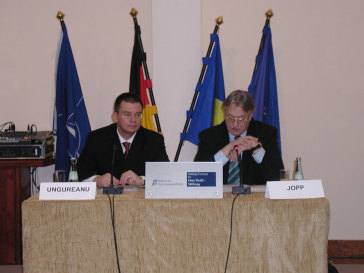IEP Lunch Debate with Mihai-Razvan UNGUREANU: “Prospects of European integration — The view of Romania as a future EU Member State”

Mihai-Razvan UNGUREANU, Foreign Minister of Romania, painted a positive picture of the current situation in Romania, which will be part of the 5th wave of EU enlargement. According to him, Romania will bring with it an array of positive characteristics into the EU: the economy is showing high growth rates, the workforce is very well-trained and Romania is a large export market for goods from the member states of the EU. Romania however shares structural and societal problems with many member states, such as a growing older population and a declining younger population, but it will work jointly in the EU toward solutions. Here it is clear, explained Ungureanu, that a liberal economic policy only in combination with basic social rights can bring Europe closer to its citizens and ensure widespread acceptance. In society, this translates to equal chances – access to education and the labor market, as well as life-long learning – and a solid infrastructure in R&D and innovation. The foreign minister emphasized that Romania could form a bridge between occident and orient. The geographical location has predestined Romania for just such a role. However, the trust of its neighbors can only be won through stronger cooperation.
Ungureanu made clear that it will come out strongly for a common Black Sea policy of the EU. Moreover, the neighborhood policy (ENP) of the EU requires new impetus and a stronger definition. The temporary interruption in gas deliveries to member states of the EU, caused by the gas conflict between Russia and Ukraine, demonstrated the momentary weakness of the ENP. In this context, relations with Russia also require new emphasis. The foreign minister also mentioned a solution to the Transnistria problem as a further responsibility of the EU-27.
The foreign minister also commented on the enlargement process in an era of globalization. Every enlargement has strengthened the EU in global competition and has represented a motor of integration. Today, the EU stands above all in competition with China and other Asian countries rather than there being competition between member states.
During the discussion, the following points were addressed and expanded upon:
- the new visa policy of Romania toward its neighbors, especially Moldova,
- transatlantic relations,
- the ratification process of the accession treaty in the member states and the possibility of postponing accession until 2008,
- how to approach the crimes of the communist security service, the Securitate.
By: Marcus Delacor
